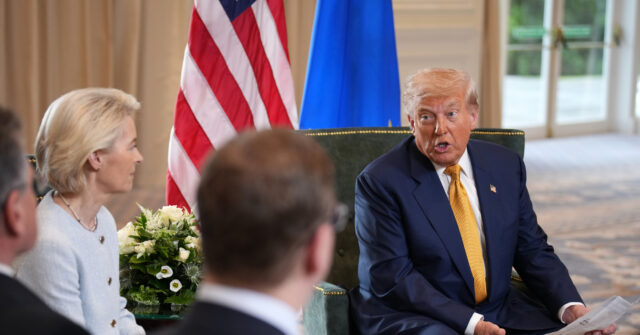European leaders appear to be in two minds about the historic trade deal negotiated by U.S. President Donald Trump and EU chief Ursula von der Leyen, with some praising the pragmatism of avoiding a broader trade war and others lambasting the deal as an effective surrender on behalf of Brussels.
Divides quickly emerged in the halls of power across Europe on Monday over the EU-US trade deal, which saw Brussels agree to buy $750 billion worth of American energy, purchase potentially hundreds of billions in U.S. weapons and military equipment, and invest $600 billion in America-based businesses, while at the same time acquiescing to a 15 per cent baseline tariff on European imports to the United States.
While the terms were agreed to in principle by EU leadership, for the deal to become binding, all 27 member states must ratify it, potentially leaving room for potential wrangling over terms and tariff exemptions or for the deal to be scuppered outright and a return to a standoff.
Coming out strongly against the deal, embattled French Prime Minister Fraçois Bayrou — who is unclear to last the year in office over internal budgetary battles in Paris — wrote that the “Von der Leyen-Trump” agreement represented a “dark day when an alliance of free peoples, united to affirm their values and defend their interests, resolves to submission.”
French opposition politicians on both the left and right also roundly criticised the deal, including populist National Rally president Jordan Bardella, who described it as “shameful” and an “embarrassment of the Macronists” who supported Von der Leyen to become Commission President. Bardella called on the Macron government to reject it and push for a deal more in favour of French interests, despite the deal having carveouts for key French industries, such as on pharmaceuticals and aeronautics.
One of the leading figures in the leftist New Popular Front alliance, François Ruffin, criticised Bayrou for complaining on the internet rather than acting, writing: “For months, we’ve been demanding the resignation of Ursula Von der Leyen and that she go back to selling Mercedes in Germany. Instead of selling out Europe, France, our agriculture, our industry. It’s time to show some pride: reject this deal!”
On the other hand, conservative Italian Prime Minister Giorgia Meloni, speaking on the sidelines of a UN food summit in Ethiopia, said that the “agreement was reached positively,” according to public broadcaster ANSA.
“I always thought, and continue to think, that a trade escalation between Europe and the United States would have had unpredictable and potentially devastating consequences,” she added, while stressing that the finer details of the deal remain to be hashed out. Therefore, a final verdict on the agreement will have to wait.
A similar sentiment was expressed from Berlin, which benefited from auto tariffs being reduced from 27.5 to 15 per cent in the deal, which Chancellor Friedrich Merz said was of “utmost importance” to Germany.
“The agreement succeeded in averting a trade conflict that would have hit the export-oriented German economy hard,” he said, per Die Welt.
Hungarian Prime Minister Viktor Orbán, one of President Trump’s key allies in the bloc, was less enthusiastic about the deal, remarking on Monday that Brexit Britain appears to have had better success than the EU in dealing with Trump, as London — free from the constraints of Brussels — managed to secure a five per cent lower baseline tariff than the European Union.
Unlike his French counterpart, Orbán laid the blame on Brussels, saying: “It wasn’t a deal that President Donald Trump made with Ursula von der Leyen – it was Trump eating von der Leyen for breakfast. This is what happened.”
Follow Kurt Zindulka on X: Follow @KurtZindulka or e-mail to: kzindulka@breitbart.com
Read the full article here


